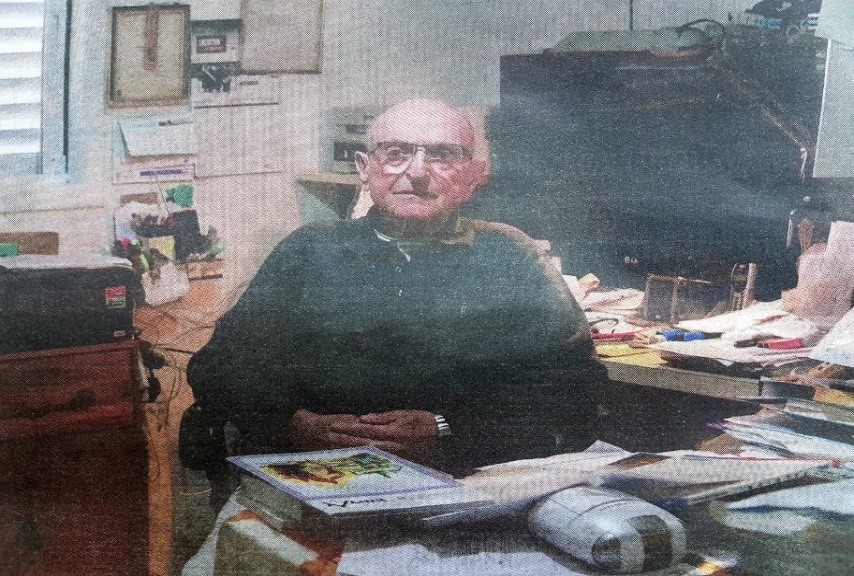Shlomo Adler: the story of the rescue of a Jew from Galicia
The Israeli newspaper Israel ha-Yom (Israel Today) published on the Day of Remembrance of Holocaust and Heroism, 2 May 2019, the story of the rescue of Shlomo Adler from the town of Bolekhiv in Western Ukraine (now Ivano-Frankivsk region).
He grew up in a strong and religious Jewish family. His father had a leather factory, and when the Bolsheviks came in 1939, his father gave bribes of boots and leather coats to the Soviet officer so that the family would not be sent to Siberia along with the rest of the wealthy Jews.
After the German invasion in June 1941, this officer told his father: "Here's a truck for you—go immediately to the East!" The father gathered the family for a meeting. Everyone was silent, and only the German refugee said: "Abraham, do you want to run to the communists? Did not you tremble at night waiting for a knock on the door before being expelled to Siberia? The Germans are eventually people too. They will return the plant confiscated by the Soviets back to you. The family stayed.
In October 1941, a German officer and a Ukrainian policeman came to pick up his uncle. His wife begged them not to touch him and offered expensive furs. “The German agreed, but the Ukrainian said, no, he is on the list,” says Shlomo. After that, Ukrainian workers hid the Adler family in the attic of their factory.
The grandmother went out to look for the son taken by the Germans, but the Germans, together with the Ukrainian police, drove her and 1,000 Bolekhiv Jews into the hall of the local theater. The officer demanded that the two rabbis declare that only the Christian god and the German army determine the course of history. Those rabbis refused. The Germans made a woman dance naked on stage, and when the rabbi turned away, his eyes were knocked out. Then they all were taken to the forest and shot.
In the spring of 1942, the Germans arrested Shlomo's father. His mother tried to bribe the commander of the Ukrainian police to free her husband, but the Germans learned about this. Mom was hiding, but then came home—to prepare on the eve of Passover. “I told my mother—you shouldn’t owe Him if He does such horrors to us. Mom raised her finger: “I owe. This is a tradition, and it will save us." "The last time I saw mother at the station was guarded by a Ukrainian police officer. I knelt before him so he would allow me to say goodbye to my mother," says Shlomo.
Further, the thirteen-year-old Shlomo was forced to work in a labor camp—right up to the execution of all the Jews. He escaped to hide in a swamp, and then a local Ukrainian in a neighboring village hid him and his friends for an entire year until the arrival of the Red Army in August 1944.
Of the four thousand Jews of Bolekhiv—a third of the population of the town—only 45 survived the war. Four Ukrainians in Bolekhiv were shot by the Germans for hiding Jews.
Shlomo moved to Lublin at the age of fourteen-and-a half and joined the Polish army, stating that he was seventeen-and-half years old. He hid his Jewish identity. He participated in the liberation of Warsaw. He was then assigned to the Polish police. In 1946, the sixteen-year-old Shlomo Adler asked his commander to assist in apprehending the killer of his sister, two uncles, and their children.
“It was a Ukrainian Matovitsky, nicknamed “the Butcher,” who killed more than 390 Jews himself. I was told that he was living near Cracow. When he was found, he resisted by shooting back and grenades were thrown into his house. When they broke into the house they found the dead wife and baby of this former policeman on the floor. The wounded policeman shouted, “Shoot me!” Shlomo said, “I looked at him and did not know if it was Matovitsky or not—because I had never seen him before. Those who saw him were dead. The commander handed me a pistol and said, "close the account with him." I refused, I am not like them. I came out and heard a shot. "
Shlomo was put into a Soviet prison in Poland, where he was beaten for four days, but through the Red Cross managed to leave for France. He then sailed to the shores of Haifa on a ship with refugees, but they were detained by the British fleet and sent to a concentration camp in Cyprus. Only in September 1947 did the seventeen-year-old Shlomo Adler reach the Land of Israel, and then went through the entire War of Independence. He married Esther, who also escaped from Poland. They now have two children, five grandchildren, and four great-grandchildren.
After sixty years, it turned out that Shlomo’s companions had killed another ex-policeman who was guarding Matovitsky in that village. But the "Butcher" managed to escape after the war to Canada. When the American writer Daniel Mendelsohn published the book The Lost: A Search for Six of Six Million (2006) about the death of the Jews of Bolekhiv, Matovitsky’s son from Canada called his brother—a surgeon in Dallas in the U.S.—and said: "Read this book—you will find out who our father really was."
The son erased the family name of the father, went to his native town, stood at the entrance to the church when people were leaving the prayer service on Sunday, and said to them: "My father was a murderer who killed 390 Jews." This son traveled from Canada to Israel to Shlomo Adler and repented for the sins of his father.





















